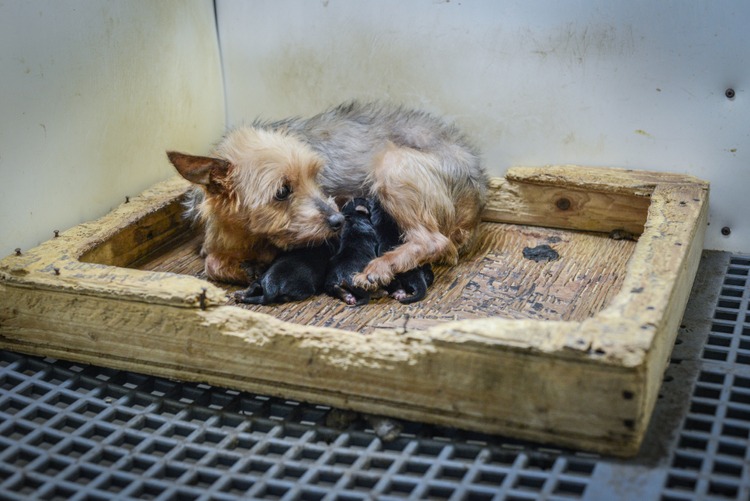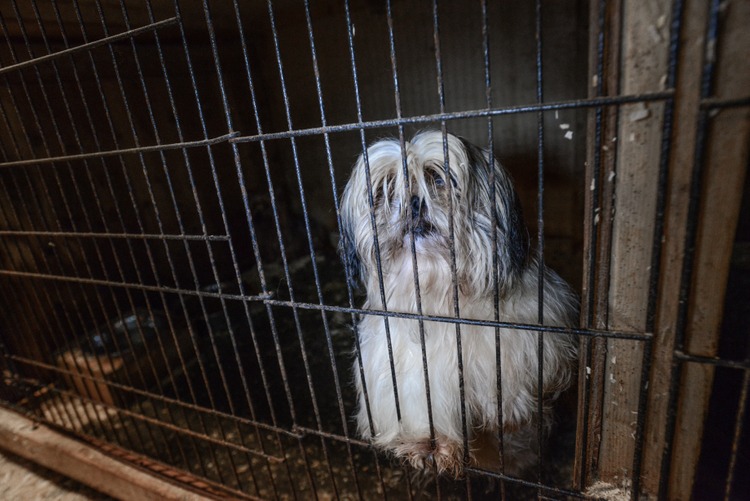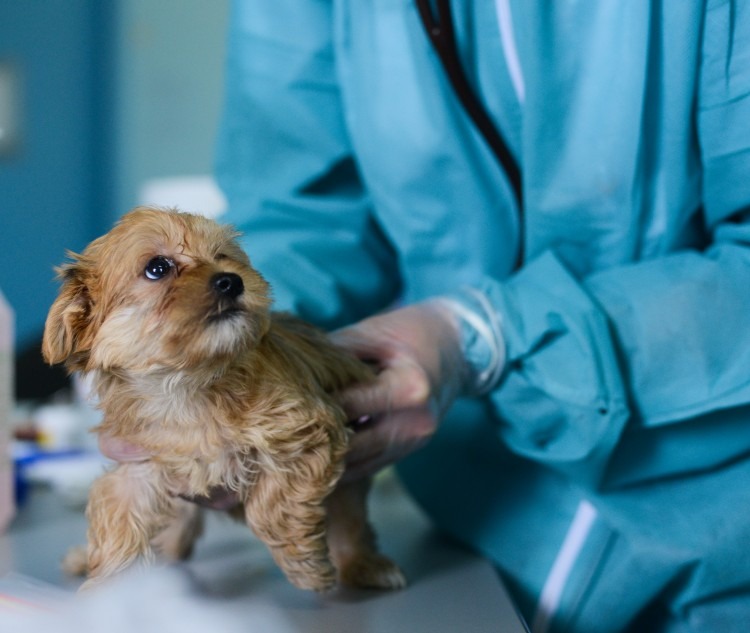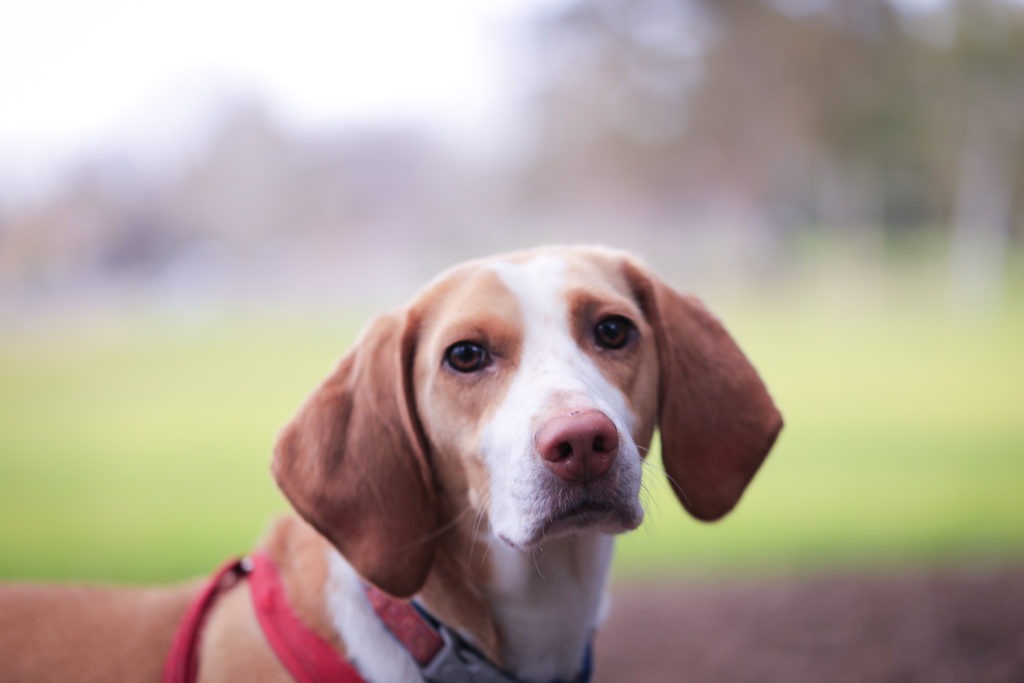
The majority of households in Australia have a dog, cat, or other companion animal. However, sadly many of these animals start their life in puppy farms where they are bred intensively for profit. Puppy farms have inherently significant implications for animal health and welfare, and increasingly across Australia a movement is building to ban puppy farming under the law.
What is puppy farming?
‘Puppy farming’ is a term commonly used to describe intensive dog breeding practices that fail to meet the physical, social or behavioural needs of animals.1 Also known as ‘puppy factories’ or ‘puppy mills’, they typically involve large, for-profit breeding operations but can also be smaller-sized businesses that keep animals in overcrowded and unhygienic conditions, which fail to provide proper care.
What are the welfare issues?
There are many welfare issues associated with puppy farms, which differ depending on the circumstances. In extreme cases, animals can be denied adequate food, water or shelter; or left without veterinary care after becoming sick. Many animals are kept in small cages and not socialised properly, often resulting in extreme anxiety or psychological damage.2
Poor breeding practices can lead to a variety of health problems in adult breeding dogs and their offspring. Puppies, which at first glance appear healthy, can present with health issues after they have left the breeder to be sold to pet stores, pet brokers or directly to the public.
In ‘better’ breeding establishments, animals are kept in conditions that abide by all anti-cruelty laws, and obey all applicable regulations or rules for breeding. Within the confines of the law, however, animals can be kept in conditions that many would still consider to be inhumane. For example, in Victoria, breeders may be subject to the Code of Practice for the Operation of Breeding and Rearing Businesses 2014 (revision 2018) (‘the Victorian Code of Practice’). This sets out the minimum standards of care for dogs and cats kept in breeding establishments. Under the Victorian Code of Practice, breeders are only required to provide a minimum of 30 minutes of exercise twice daily for adult dogs meaning that dogs can lawfully be left inside cages for 23 hours per day.3

Case Study: 2015 Pyramid Hill Prosecution
In 2015, a Victorian family pleaded guilty to 240 charges associated with their dog breeding business, which they operated from a rural property in Pyramid Hill. The RSPCA raided the property two years earlier, finding hundreds of dogs surviving in what they described as ‘putrid’ conditions.4 Reports indicate that some animals were so traumatised they could not even be handled by rescuers without sedation. The court heard that the breeders failed to provide adequate socialisation and enrichment to the animals, along with insufficient food and vet care. The family ultimately received a $205,000 fine and were ordered to pay an additional $82,580 in costs.5
How is puppy farming regulated in Australia?
Interestingly, there is no legal definition of the term ‘puppy farming’ in Australia. The laws and regulations surrounding dog and cat breeding are set at a state and territory level, and local governments also form part of the management of dog and cat breeding. A lack of consistency between jurisdictions means that breeders will be subject to different rules and regulations depending on where they live.
Law reform in Victoria
Following passage of the Domestic Animals Amendment (Puppy Farm and Pet Shops) Act 2017 (Vic), Victoria is now considered to have the strongest anti-puppy farm laws in Australia. Victorians who own just one (1) or two (2) fertile female cats or dogs, and breed to sell, are categorised as ‘microbreeders’, who do not have to register with a local council, and are not subject to the Victorian Code of Practice. However, those who own between three (3) and ten (10) fertile female dogs and breed to sell are classified as ‘recreational breeders’.
Recreational breeders must be a member of an organisation such as Dogs Victoria and abide by their organisation’s code of ethics (or equivalent). Alternatively, breeders who keep between three (3) and ten (10) fertile female dogs to breed to sell, but are not a member of an applicable organisation, must register with their local council as a ‘breeding domestic animal business’ (or ‘DAB’) and abide by the Victorian Code of Practice. Breeders with eleven (11) or more fertile female dogs must first register with their local council as a DAB and then seek ministerial approval to become a ‘commercial dog breeder’. As a condition of approval by the Minister for Agriculture, commercial dog breeders are allowed to keep a maximum of fifty (50) fertile female dogs within their business.6 Commercial dog breeders are also subject to the Victorian Code of Practice.7
While these kinds of measures are useful, they do not prevent breeders from other states and territories shipping puppies into Victoria for sale directly to the public or online.
Pet stores in Victoria are banned from selling or otherwise giving away dogs and cats unless they are sourced from registered shelters, pounds or foster carers.8 In an effort to increase traceability, anyone selling or rehoming a dog in Victoria must enrol in the ‘Pet Exchange Register’, which is maintained by Animal Welfare Victoria; a government agency within the Department of Agriculture. Sellers will then be issued a ‘source number’, which they must include in any pet sale advertisements. This allows prospective buyers to search the Pet Exchange Register to check that the source number is valid.9

Progress outside Victoria
Other Australian states and territories have not yet followed Victoria’s lead, failing to implement the same restrictions over breeding practices and businesses.10 For example, NSW laws and regulations do not impose a cap on the number of fertile female dogs that a business can own, and pet stores are free to source their animals from for-profit breeding businesses.11 Other jurisdictions have similarly inadequate protection measures.
In 2020, the Dog Amendment (Stop Puppy Farming) Bill 2020 was introduced in the Parliament of Western Australia. This Bill aimed to introduce mandatory de-sexing, implement a ban on the sale of animals in pet shops unless sourced from shelters, and improve traceability.
Related Blog: 6 Animal Law Wins That Gave Us Hope in 2020.
Unfortunately the proposed legislation was not passed by the Upper House before State Parliament was prorogued in December 2020 ahead of the next election.12 In South Australia, the Labor Opposition recently pledged to introduce anti-puppy farm legislation should the party form government at the next state election in March 2022.13
The differences in breeding standards between states and territories is a prime example of why Australia needs consistent animal protection legislation, coordinated at a federal level. The lack of a consistent framework creates confusion for companion animal buyers, who may not fully understand the conditions under which their dog was born. As a result, they may inadvertently buy a puppy from a puppy farmer.
Learn why Australia needs to introduce an Independent Office of Animal Welfare here.

What are animal lawyers doing to address this problem?
Because animals are considered property in the eyes of the law, animals do not have ‘legal standing’ and are therefore unable to initiate any legal action in their own right. Instead, lawyers have to find creative ways to help animals through the existing legal framework in Australia.
Many assume that the only way to combat puppy farming is through anti-cruelty laws. In reality, there are many other interesting legal avenues to consider, such as using the Australian Consumer Law (‘ACL’).14
Domestic animals such as dogs and cats are classified under the ACL as ‘goods’.15 The ACL provides a set of automatic rights, known as ‘consumer guarantees,’ in relation to any goods or services supplied within trade or commerce in Australia.16 For example, goods must be of acceptable quality, be fit for purpose, and must match their provided description.17 Relying on these guarantees, consumers may be able to seek a remedy either against the supplier or the manufacturer of a pet, that is, the seller or breeder of a dog. Similarly, consumers may also be able to seek remedies from breeders under the ACL for misleading or deceptive conduct in trade or commerce.18
Learn more about the moral and legal status of animals in Australia here.
Case study: Nala and The Animal Law Institute
The Animal Law Institute (ALI) is a non-profit community legal centre that is dedicated to protecting animals and advocating for their interests through the Australian legal system. ALI provides pro bono legal advice across a number of areas of law, and has helped individuals seek justice after falling victim to puppy farmers.
In July 2018, ALI launched legal action against the breeders of a beagle-cross dog named Nala seeking to hold them accountable for the consequences of their alleged negligent breeding practices. When she was born, Nala suffered from a severe worm infestation that nearly took her life. Her family realised something was very wrong soon after they brought her home from the breeder, and sought urgent veterinary care. Their vet determined that Nala’s worm infestation was passed onto her in utero, meaning that Nala’s mother already had the condition while being used as a breeding dog. At the Victorian Civil and Administrative Tribunal (VCAT), ALI successfully argued that breeders who fail to take proper care when breeding animals should be liable to pay for the veterinary fees that are later incurred by owners to treat their sick pets, including future costs. Nala’s breeders were ordered to pay over $15,000 for past and future medical expenses. Because of her original worm infestation, Nala requires a life-long, expensive prescription diet and still suffers from a range of health concerns. Nonetheless, Nala’s family were fortunate enough to seek legal advice and find out how to take action against the breeder. More information about Nala’s case can be found at the Animal Law Institute.

How can we hold puppy farmers accountable?
Throughout the COVID-19 pandemic, there has been an increase in the number of Australians buying dogs and cats online, including so-called ‘designer’ breeds. This increased demand provides a greater incentive for businesses to over-breed dogs and cats, with a view to increasing volume of sales as quickly as possible. This can lead to negative welfare implications for the animals involved.
Related Blog: Suffering by Design – Why We Need Better Laws to Regulate Designer Dog Breeding.
ALI has established, with the support of the Victorian Government, an Anti-Puppy Farm Legal Clinic in response to COVID-19 and the range of welfare issues associated with puppy farming. ALI lawyers are providing free legal advice to the public about their consumer rights, and how the law can be used to seek justice on behalf of sick animals acquired from breeders or pet stores. Further information is available at the Animal Law Institute.
What is Voiceless’s position on puppy farming?
Voiceless encourages companion animal rescue and adoption, and is opposed to the commercial breeding of cats and dogs in puppy farms and the breeding of companion animals for pet shops. Intensive companion animal breeding is a wholly unnecessary and unethical practice, especially considering the hundreds of thousands of cats and dogs in pounds, rescue shelters and foster care in need of permanent homes.
Learn more
- Learn more about animal law.
- Listen to our Voiceless Animal Law Talk podcast featuring Georgie Purcell, Vice-President of Oscar’s Law – an organisation seeking to end the factory farming of companion animals.
- Read the Voiceless Animal Law Toolkit to learn more about how puppy farming is regulated in Australia.
- Read articles on the Voiceless Blog exploring the issue of companion animal breeding.
This page was produced with the generous assistance of our friends at the Animal Law Institute. This page does not constitute legal advice and should not be taken as such. Should you require legal assistance in relation to a dispute or question specific to your circumstances, you should consult a lawyer.
Last updated April 2021
_________________________________________________________________________________________________________________________
- There is no legal definition of a ‘puppy farm’ in Australia. RSPCA Australia describes a puppy farm as “an intensive dog breeding facility that is operated under inadequate conditions that fail to meet the dogs’ behavioural, social and/or physiological needs”: ‘What is a Puppy Farm?’, RSPCA Australia (Web Page, 30 April 2019) <https://kb.rspca.org.au/knowledge-base/what-is-a-puppy-farm/>.
- For more information about the welfare issues associated with intensive dog breeding operations, visit the Oscar’s Law website: ‘What are Puppy Factories?’, Oscar’s Law (Web Page) <https://www.oscarslaw.org/what-are-puppy-factories.htm>.
- Animal Welfare Victoria, Department of Jobs, Precincts and Regions (Vic), Code of Practice for the Operation of Breeding and Rearing Businesses 2014 (revision 2018) s 6(4)(a) table 1, p 34 (‘Victorian Code of Practice’).
- Tom Minear, ‘‘Putrid’ Puppy Farm Closed as Breeder Dean Peace Pleads Guilty to Animal Cruelty’, Herald Sun (online, 29 May 2015) <https://www.heraldsun.com.au/news/law-order/putrid-puppy-farm-closed-as-breeder-dean-peace-pleads-guilty-to-animal-cruelty/news-story/29bab846d79cf1a9aec57c0812b12ec3>.
- Adam Holmes, ‘Pyramid Hill Puppy Farm Family Fined $205,000’, Bendigo Advertiser (online, 24 September 2015) <https://www.bendigoadvertiser.com.au/story/3376972/pyramid-hill-puppy-farm-family-fined-205000/>.
- Domestic Animals Act 1994 (Vic) s 58AF(2).
- The definitions of ‘microbreeder’, ‘recreational breeder,’ ‘breeding domestic animal business’ and ‘commercial dog breeder’ can be found in the Domestic Animals Act 1994 (Vic) s 3(1); For an overview of the amendments see Department of Agriculture Victoria, ‘Regulations for Cat and Dog Breeders’, Animal Welfare Victoria, (Web Page, 11 January 2021) <https://agriculture.vic.gov.au/livestock-and-animals/animal-welfare-victoria/domestic-animal-businesses/breeding-and-rearing-businesses/regulations-for-cat-and-dog-breeders>.
- Domestic Animals Act 1994 (Vic) ss 63AAA–63AAB.
- See generally ibid pt 5C div 3.
- See ‘Legislation in Each State’, Oscar’s Law (Web Page) <https://www.oscarslaw.org/legislation-in-each-state.htm>.
- See generally Department of Industry and Investment (NSW), Animal Welfare Code of Practice – Breeding Dogs and Cats (August 2009) <https://www.dpi.nsw.gov.au/__data/assets/pdf_file/0004/299803/Breeding-dogs-and-cats-code-of-practice.pdf>.
- The full text of the bill and information about its status can be found at the Parliament of Western Australia website: ‘Dog Amendment (Stop Puppy Farming) Bill 2020’ (Web Page) <https://www.parliament.wa.gov.au/parliament/bills.nsf/BillProgressPopup?openForm&ParentUNID=5BC24C86BF629393482585120024643F>.
- Peter Malinauskas (Facebook, 21 February 2021, 10.31am AEST) <https://www.facebook.com/PMalinauskasMP/posts/3722791757807112>.
- Competition and Consumer Act 2010 (Cth) Sch 2 (’ACL’).
- Ibid s 2 (definition of ’goods’).
- Ibid pt 3-2 div 1.
- Ibid ss 54–6.
- Ibid s 18.
